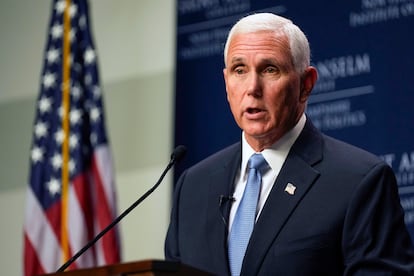Ex-VP Mike Pence: “I won’t support Trump, but I can’t vote for Biden”
Increasingly distanced from his former boss, Pence urges Europe to trust his country regardless of the November election outcome

Mike Pence was the second most powerful man in the United States behind Donald Trump. who many consider one of the most dangerous men in the world during his time in the White House. The Republican former vice president distanced himself from Trump, leading to a rift that widened after the January 6 Capitol Hill riot by Trump supporters who refused to accept defeat by Joe Biden.
Pence, a conservative Christian who resisted Trump’s pressure to not certify the Democratic victory in 2020, gave up his bid for the White House last October . But he made it clear earlier this year that he cannot “in good conscience” endorse Trump. In a brief meeting with EL PAÍS in Brussels, Pence said that he has no regrets about his vice-presidency and still believes that the Republican Party will win the White House and reaffirm “American global leadership.” He called on Europe and the world to trust in his country, despite everything.
“It’s no surprise that, with our differences, I won’t be backing Donald Trump this election. However, I could never vote for Joe Biden and will continue to advocate for what I believe the Republican Party should stand for. Every American should vote their conscience, as I will,” Pence said.
The former vice president was in Brussels for a brief visit ahead of Saturday’s crucial vote in the House of Representatives on the $95 billion foreign aid package for Ukraine, Israel and Taiwan that a handful of Republicans have been blocking for months. Pence, who openly supports the aid package, encountered uneasy European allies in Brussels because of Republican delay tactics and concerns about Trump’s potential return to the White House.
Pence has faced much concern in forums, interviews and private meetings about the delayed U.S. financial aid, which is hindering efforts to push back Vladimir Putin’s invasion of Ukraine. He was also questioned about Trump’s thinly veiled threats to allow Russia to “do whatever the hell they want” with NATO members who don’t pay up. Pence was surprised and somewhat annoyed by Europe’s doubts about his country, and reassured long-standing allies that they can still count on the United States, regardless of the November election outcome.
“Our European allies should trust America,” Pence said. “I think many Americans understand our special role as leader of the free world. Despite challenges at home, I expect most legislators will support funding Ukraine, Israel and Taiwan this weekend. They will also take a firm stance against China and push for government divestment of TikTok. We will choose to emulate Churchill rather than Chamberlain. This will reaffirm our dedication as the leader of the free world.”
The conservative Christian expressed dissatisfaction with Trump’s position on abortion restrictions during a speech at the German Marshall Fund (GMF) think tank in Brussels. Pence reiterated this sentiment to European Council President Charles Michel in a private meeting. Michel was appreciative of Trump’s recent message to Congress that the survival of Ukraine is important to the United States, a recent shift in tone for the candidate. European impatience with Washington’s inaction has become widespread on social media.
Meeting with skepticism in Europe is nothing new for Pence. As he mentioned during the GMF talk, his first trip abroad as vice president was to the Munich Security Conference. “I’ve been in warmer fridges,” he joked. Back then and now, he believes that Europe did not grasp the Trump administration’s strategy of pressuring — some would say threatening — U.S. allies to increase NATO spending.
“When we took office, only two NATO countries were meeting the commitment to spend 2% of their GDP on defense. By the time we left, many allies were on track to meet or exceed this level,” he said in defense of what he calls a “tough love” policy. It was a strategy that “laid the groundwork for allies to be better prepared to support Ukraine after the Russian invasion.” Pence concluded, “as long as we keep the promises we make, I believe in a bright future for NATO and for freedom.” Even with Trump back in office?
"Biden gave in to Maduro"
There was no time for a lengthy Q&A with Mike Pence during our alloted five minutes with Mike Pence. But as we wrapped up, Pence said he was surprised we didn't ask about Latin America. Eager to discuss Venezuela, despite his impatient aides, Pence squeezed in two more minutes to criticize "dictator" Nicolás Maduro and Biden's "capitulation" to "socialism and dictatorship" in Caracas.
"Our administration isolated Maduro, believing we were on a path to fair and free elections. Biden lifted the sanctions [partially reinstated recently] and gave in to Maduro who continues oppressing the opposition. I'm deeply disappointed," Pence said. He expressed his hope that the U.S. will "once again champion the cause of freedom in Venezuela" in the near future.
Sign up for our weekly newsletter to get more English-language news coverage from EL PAÍS USA Edition
Tu suscripción se está usando en otro dispositivo
¿Quieres añadir otro usuario a tu suscripción?
Si continúas leyendo en este dispositivo, no se podrá leer en el otro.
FlechaTu suscripción se está usando en otro dispositivo y solo puedes acceder a EL PAÍS desde un dispositivo a la vez.
Si quieres compartir tu cuenta, cambia tu suscripción a la modalidad Premium, así podrás añadir otro usuario. Cada uno accederá con su propia cuenta de email, lo que os permitirá personalizar vuestra experiencia en EL PAÍS.
¿Tienes una suscripción de empresa? Accede aquí para contratar más cuentas.
En el caso de no saber quién está usando tu cuenta, te recomendamos cambiar tu contraseña aquí.
Si decides continuar compartiendo tu cuenta, este mensaje se mostrará en tu dispositivo y en el de la otra persona que está usando tu cuenta de forma indefinida, afectando a tu experiencia de lectura. Puedes consultar aquí los términos y condiciones de la suscripción digital.









































